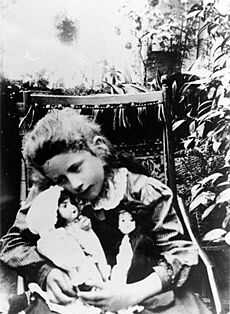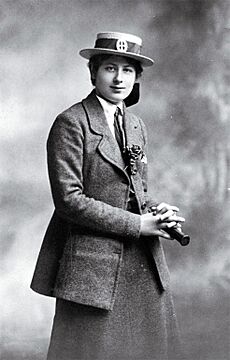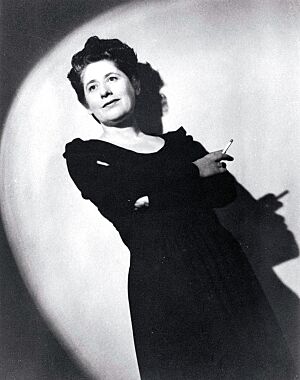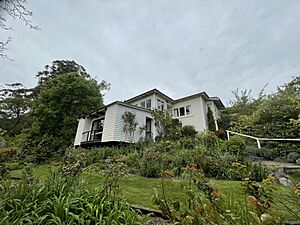Ngaio Marsh facts for kids
Quick facts for kids
Ngaio Marsh
|
|
|---|---|
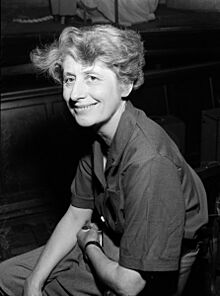
Ngaio Marsh, Sydney, 14 January 1949
|
|
| Born | Edith Ngaio Marsh 23 April 1895 Christchurch, New Zealand |
| Died | 18 February 1982 (aged 86) Christchurch, New Zealand |
| Occupation | Writer, theatre director |
| Language | English |
| Education | St Margaret's College, Christchurch |
| Alma mater | University of Canterbury |
| Genre | Crime fiction |
| Literary movement | Golden Age of Detective Fiction |
| Relatives | Robert Speight (uncle) |
Dame Edith Ngaio Marsh (born April 23, 1895 – died February 18, 1982) was a famous writer and theatre director from New Zealand. She became a Dame Commander of the Order of the British Empire in 1966, which is a special honour.
Ngaio Marsh was known as one of the "Queens of Crime" during the "Golden Age of Detective Fiction". This was a time when detective stories were very popular. Other famous writers from this time included Agatha Christie and Dorothy L. Sayers. Marsh is best known for her detective character, Roderick Alleyn, who worked for the police in London.
Today, there is an award named after her, the Ngaio Marsh Award. It is given every year for the best mystery, crime, and thriller books written in New Zealand.
Contents
Early Life and Education
Ngaio Marsh was born and died in Christchurch, New Zealand. Her first name, Ngaio, is a Māori word. It can mean "light on the water" or it is the name of a native flowering tree.
She was the only child of Rose and Henry Marsh. Ngaio went to St Margaret's College, Christchurch, where she was one of the first students. She also studied painting at the Canterbury College School of Art.
In 1916, she started working as an actress with the Allan Wilkie company and toured New Zealand. Later, in 1928, she moved to London. From then on, she spent her time living in both New Zealand and the United Kingdom.
While in London, she started writing articles for newspapers in New Zealand. She also opened a shop called Touch and Go, which sold handmade items. It was during this time that she wrote her first book, A Man Lay Dead.
Writing Career
Ngaio Marsh is famous around the world for her 32 detective novels. She wrote these books between 1934 and 1982. She is considered one of the four "Queens of Crime" who were very popular in the 1920s and 1930s.
All of her novels feature a British detective named Roderick Alleyn. Many of her stories are about things she loved, like the theatre and painting. Several books are set around plays and actors, such as Enter a Murderer and Opening Night.
Detective Alleyn even marries a painter named Agatha Troy in one of the books, Artists in Crime. She then appears in three more of his adventures.
Most of Marsh's novels take place in England. However, four of them are set in New Zealand. In these stories, Alleyn is either working with the New Zealand police or on holiday. One of her books, Colour Scheme, includes Māori people as characters, which was unusual for British mystery novels at the time.
In 2018, a new book called Money in the Morgue was released. Ngaio Marsh had started writing it during World War II but never finished it. Another writer, Stella Duffy, completed the novel using Marsh's notes.
Passion for Theatre
Ngaio Marsh loved the theatre very much. In 1942, she directed a modern version of Shakespeare's Hamlet for the Canterbury University College Drama Society. This was the first of many Shakespeare plays she directed for the society until 1969.
Her productions of Hamlet and Othello toured New Zealand in 1944 and were very successful. In 1949, her student actors even toured Australia with their plays.
In the 1950s, she worked with the New Zealand Players, a professional theatre company. Later, in 1972, she directed Shakespeare's Henry V for the opening of a new theatre in Christchurch. She made an interesting choice by having two different actors play the main role on different nights.
Ngaio Marsh helped New Zealand develop its own professional theatre industry. Many of the people she trained became important figures in theatre. The Ngaio Marsh Theatre at the University of Canterbury is named in her honour.
Ngaio Marsh's Home
Ngaio Marsh's home in Cashmere, a suburb of Christchurch, is now a museum. It is called Ngaio Marsh House and helps people learn about her life.
Awards and Special Honours
Ngaio Marsh received many awards and honours during her life:
- 1948 – She was made an Officer of the Order of the British Empire for her work in drama and literature in New Zealand.
- 1962 – The University of Canterbury gave her an honorary degree.
- 1966 – She was appointed a Dame Commander of the Order of the British Empire for her services to the arts, especially writing and theatre.
- 1978 – She received the Grand Master Award from the Mystery Writers of America for her lifetime achievements as a detective novelist.
- 1989 – New Zealand Post honoured her with a special stamp as part of a series about New Zealand authors.
- 2015 – On April 23, 2015, she was honoured with a Google Doodle.
About Her Life
Ngaio Marsh never married and did not have any children. She had close friendships with women, including her lifelong friend Sylvia Fox.
In 1965, she wrote her own life story in a book called Black Beech and Honeydew. Other authors also wrote books about her life, including Margaret Lewis and Joanne Drayton. Towards the end of her life, she destroyed many of her personal papers and letters.
Ngaio Marsh passed away in Christchurch and was buried at the Church of the Holy Innocents, Mount Peel.
Books and Plays on Screen and Radio
Some of Ngaio Marsh's novels have been made into television shows and radio plays:
- Two of her novels, Death in Ecstasy and Artists in Crime, were made into TV episodes in the 1960s.
- In 1977, four of her Alleyn novels were adapted for television in New Zealand as Ngaio Marsh Theatre. Ngaio Marsh herself even made a small appearance in the episode "Vintage Murder".
- Nine of her books were adapted by the BBC as The Inspector Alleyn Mysteries in the 1990s.
- The BBC also made radio adaptations of some of her novels, including Surfeit of Lampreys and A Man Lay Dead.
Ngaio Marsh also helped write a television episode called Night at the Vulcan in 1951. She also appeared as herself in a TV series about an unfinished mystery novel by Charles Dickens.
See also
 In Spanish: Ngaio Marsh para niños
In Spanish: Ngaio Marsh para niños


